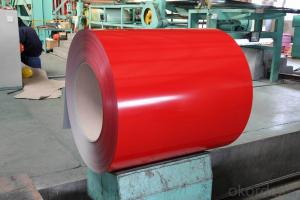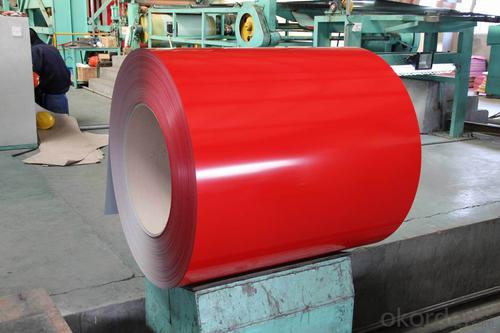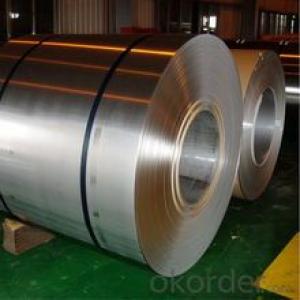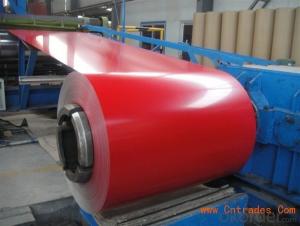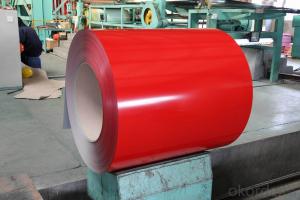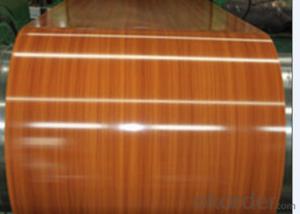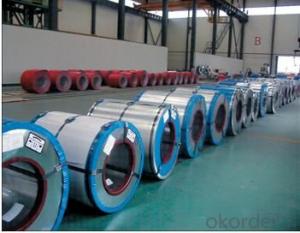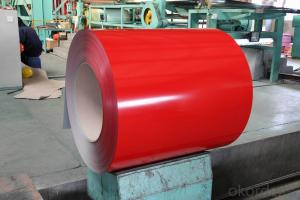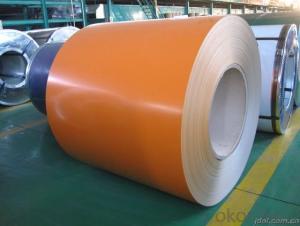Prepainted Galvanized Steel-CGC490--High Strength
- Loading Port:
- China main port
- Payment Terms:
- TT OR LC
- Min Order Qty:
- 50 m.t.
- Supply Capability:
- 10000 m.t./month
OKorder Service Pledge
OKorder Financial Service
You Might Also Like
Prepainted Galvanized Steel-CGC490--High Strength
Brief Introduction
Prepainted Galvanized Steel usually refersto have substrate processed with surfaceprocessed and coated then(rollercoated )or bonded organic thin film and baked, and it is able to beprocessed to final prodevtion .
PrepaintedGalvanized Steel qualified with excellent decorative ,formability ,corrosionresistance ,coating adhesion ,can keep for a long time as well as maintainfresh color .For color coated steel sheet can obtain good economicbenefit by steel belt wood ,efficient in construction and save energy ,preventpollution etc.Which is an ideal material;for manufacturing board.
Specification:
Thickness: 0.15-0.8mm
Width: 600-1250mm
Length: on request
Zinc coating: 30-275g/m2
Color: RAL series
Paint: PE, PVDF, PU
Application:
1.Buildingsand constructions: roofing, ceilings, gutters, venting lines, indoordecorations,window frames, etc
2.Electrical appliances: computer shells, washing machines,refrigerators, dehumidifiers,video recorders, water heaters, etc.
3. Agricultural equipments: troughs, feeding tools,agricultural driers, irrigation channels, etc.
4. Vehicle parts: back-seat plates of buses and trucks,conveying systems, oil tanks, etc.
Images:
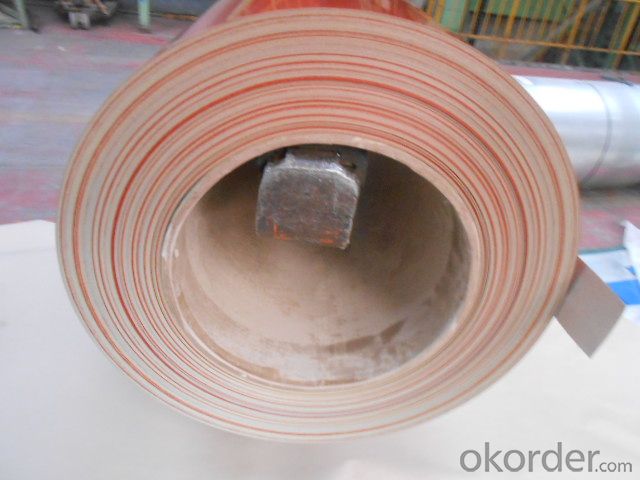
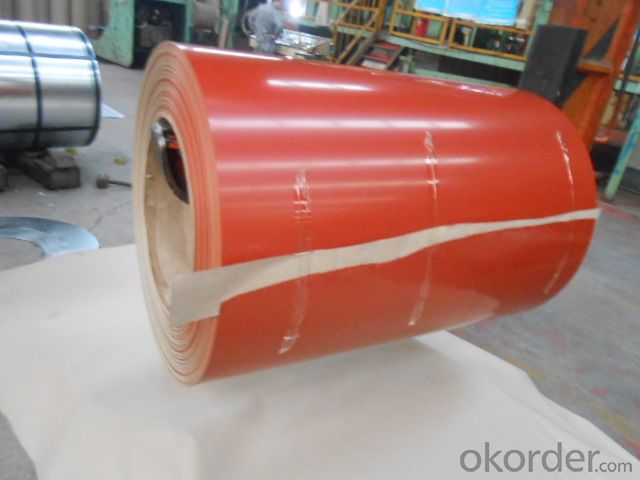
Advantages:
1. High strength
2. Well rainproof performance
3. Good corrosion
4. Easy to install and remove
5. FAQ
1.How to guarantee the quality of the products?
We have established the international advanced quality management system,every link from raw material to final product we have strict quality test;We resolutely put an end to unqualified products flowing into the market. At the same time, we will provide necessary follow-up service assurance.
2. How long can we receive the product after purchase?
Usually within thirty working days after receiving buyer’s advance payment or LC. We will arrange the factory manufacturing as soon as possible. The cargo readiness usually takes 15-25 days, but the shipment will depend on the vessel situation.
- Q: What are the different methods of tension leveling for steel coils?
- There are several methods of tension leveling for steel coils, each with its own advantages and applications. 1. Roller leveling: This method involves passing the steel coil through a series of rollers under high tension. The rollers are strategically positioned to apply pressure on the coil, effectively stretching and elongating it. Roller leveling is commonly used for thinner gauge coils and is effective in removing coil set, crossbow, and edge wave defects. 2. Stretch leveling: In this method, the steel coil is subjected to a combination of tension and elongation. The coil is gripped by clamps at both ends and then stretched using hydraulic or mechanical devices. This process helps to remove residual stresses, flatten the coil, and improve shape control. Stretch leveling is particularly suitable for thicker gauge coils and can effectively eliminate wavy edges and center buckle. 3. Temper rolling: This method involves passing the steel coil through a series of temper rolls, which apply pressure on the surface of the coil. Temper rolling is primarily used to improve the surface finish of the steel and enhance its mechanical properties. It can also help to reduce coil set and improve flatness. 4. Skin pass rolling: In this method, the steel coil is passed through a series of rolls that apply a light pressure on the surface. Skin pass rolling is typically performed after the primary leveling process to further improve surface finish, enhance flatness, and reduce surface defects such as scratches or marks. 5. Stretcher leveling: This method involves clamping the steel coil at both ends and then applying tension to stretch it. The stretched coil is then held in this position for a period of time to allow for stress relief and shape correction. Stretcher leveling is commonly used for thicker gauge coils and can effectively remove coil set, crossbow, and center buckle. Each of these tension leveling methods offers unique advantages and is suitable for different types of steel coils and specific requirements. The choice of method depends on factors such as coil thickness, desired flatness, surface finish, and the specific defects that need to be corrected.
- Q: What are the common sizes of steel coils used in the industry?
- The common sizes of steel coils used in the industry vary depending on the specific application and requirements. However, some commonly used sizes include widths ranging from 24 to 72 inches and thicknesses ranging from 0.010 to 0.250 inches.
- Q: What minerals are mixed to make steel?
- W - weldable steel WT- Weldable Noctch-tough steel R - Atomospheric corrosion-resistant steel A - Atomospheric corrosion-resistant steel weldable steel R - Atomospheric corrosion-resistant steel weldable Notch-tough steel Q- Quenched and tempered Low-alloy Steel QT-Quenched and tempered Low-alloy Steel Notch-tough steel For W and WT: C, Mn, P, S, Si, small quanties Cb,V,Al For R, A, AT: C, Mn, P, S, Si, Cr, Ni, Cu small quanties Cb,V,Al For Q: C, Mn, P, S, Si, Cr, Ni, Cu, and small amounts of boron See CSA G40.21 if you want more info
- Q: What are the different types of steel coatings used on coils?
- There are several types of steel coatings used on coils, including galvanized, galvannealed, and organic coatings. Galvanized coatings involve applying a layer of zinc to the steel surface, providing excellent corrosion resistance. Galvannealed coatings involve a two-step process where the steel is first galvanized and then heated to form an alloyed surface layer, offering enhanced paint adhesion and weldability. Organic coatings, on the other hand, use paints or other protective coatings to provide corrosion resistance and aesthetic appeal.
- Q: How do steel coils contribute to the agricultural sector?
- Steel coils contribute to the agricultural sector in various ways. Firstly, steel coils are used in the manufacturing of agricultural machinery and equipment such as tractors, harvesters, and irrigation systems. These machines are essential for efficient farming operations, helping farmers increase productivity and reduce labor costs. The strength and durability of steel coils ensure that the machinery can withstand the harsh conditions of the agricultural environment. Additionally, steel coils are used in the construction of storage facilities and warehouses for storing agricultural products. These structures need to be strong and resistant to external elements to protect the crops from damage. Steel coils provide the necessary strength and stability required for constructing these storage facilities, ensuring the safe storage of agricultural produce. Furthermore, steel coils are used in the fabrication of fencing and other agricultural infrastructure. Fencing is crucial in protecting crops from animals and preventing trespassing. Steel coils provide a robust material for fencing, ensuring the security and protection of agricultural lands. Moreover, steel coils are utilized in the production of irrigation pipes and systems. Efficient irrigation is vital for the growth and yield of crops, especially in areas with limited water resources. Steel coils are used to manufacture pipes that can withstand high pressure and are resistant to corrosion, ensuring the efficient distribution of water throughout the agricultural fields. In summary, steel coils play a significant role in the agricultural sector by providing the necessary materials for manufacturing machinery, constructing storage facilities, fencing, and irrigation systems. The strength, durability, and resistance to harsh conditions make steel coils an essential component in enhancing agricultural productivity, protecting crops, and ensuring efficient farming practices.
- Q: can anyone tell me the way to bring back the shine to the stainless steel kitchen sink . It has become dull.
- A stainless steel kitchen sink is durable, easy to keep clean and disinfect, and will only grow more beautiful with age - if you take proper care of it. Clean the sink with soapy water, or a stainless steel cleaner (Spray N Sheen Stainless Steel Cleaner/Polish/Protectant) once or twice a week. Once or twice a month, fill the sink half full with a 50/50 solution of bleach and water or a special stainless steel cleaner (Stainless Steel Cleaner). Let it soak for about 15 minutes, then wash the sides and bottom and let it drain. Remember to wipe dry when done.
- Q: I don't know it is low alloy steel or high allow steel or medium carbon steel
- Yes,30CrNiMo8 is a high grade alloy steel. *These steels generally contain higher carbon concentration (0.25%). As they are hardenable their mechanical properties can be tailored to specific needs by suitable adjustment of the annealing temperature. Finished products can be hardened to have a high surface hardness in combination with a tough and ductile core. The mechanical properties increase with increasing carbon concentration. Cr and Ni add additional improvements in properties. The Mn grades are a little cheaper. V and Mo add improved temperature resistance. The grades Cxx are developed for less stringent quality requirements but are cheaper.
- Q: How are defects in steel coils detected and resolved?
- Defects in steel coils are typically detected through visual inspections, as well as non-destructive testing techniques such as ultrasonic testing and magnetic particle inspection. Once identified, the defects can be resolved through various methods including grinding, welding, or cutting and replacing the affected area. The specific resolution method depends on the nature and severity of the defect.
- Q: How are steel coils unloaded from a truck or ship?
- Various equipment and techniques are typically employed to unload steel coils from trucks or ships. The unloading procedure depends on the coils' type and size, as well as the available resources and infrastructure at the unloading site. When unloading from a truck, coil hooks are often used in conjunction with a forklift or crane. Careful lifting and positioning of the coils onto the ground or a designated storage area are carried out. Alternatively, specialized roll-off trailers may be fitted to certain trucks, enabling the coils to be rolled off the truck bed. Larger cranes are commonly utilized when unloading from a ship, given the coils' considerable size and weight. These cranes can be situated on either the ship or the dock itself. Specialized lifting hooks or spreader bars are employed to lift the coils from the ship's cargo hold, ensuring they are lowered with care onto the dock or a waiting truck. In certain instances, coil transfer cars or coil trailers are used to transport the coils from the ship's cargo hold to the unloading area. These devices are designed to safely and efficiently move and position the coils. It is important to emphasize that safety measures play a critical role during the unloading process. Properly securing the coils, ensuring equipment stability, and adhering to weight limits are essential to prevent accidents or damage to the coils, truck, or ship. In summary, unloading steel coils from trucks or ships necessitates the use of specialized equipment such as cranes, forklifts, and coil hooks. These tools, combined with meticulous planning and safety precautions, guarantee the efficient and secure transfer of the coils to their designated storage or transportation areas.
- Q: I've heard different things bout them, though I do not know this. Oh, and if you know where you can buy some raw or get custom made stuff out of black steel please let me know it would be greatly appreciated. Oh and my friend told me there is a black steel that can be sharpened and silver will be underneath, is this also true? Thank you very much for answering ^^
- Black steel is steel with a surface layer of dark coloured iron oxides used for low pressure hot water heating pipes. Black iron is iron without any finish on it, which is really gray-black in color. they may be the same as many people often confuse iron and steel. Since the steel is simply steel with a covering, it could describe any steel including your silver steel.
Send your message to us
Prepainted Galvanized Steel-CGC490--High Strength
- Loading Port:
- China main port
- Payment Terms:
- TT OR LC
- Min Order Qty:
- 50 m.t.
- Supply Capability:
- 10000 m.t./month
OKorder Service Pledge
OKorder Financial Service
Similar products
Hot products
Hot Searches
Related keywords
